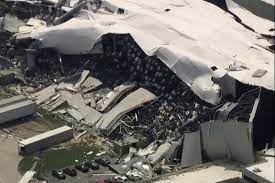On Wednesday, a tornado in Rocky Mount, North Carolina, caused major damage to a medication production complex owned by Pfizer. As a result, essential supplies for hospitals around the nation were put in jeopardy.
The business reported that one-fourth of the injectable pharmaceuticals it distributes to hospitals in the United States were manufactured at the Rocky Mount location. These medications include those used during operations and other procedures to assist block patients’ perception of pain, keep them sedated, and combat infections.
It seems from video footage taken at the scene, interviews with the Nash County sheriff, and statements made by those who were briefed on the damage that the tornado was responsible for the majority of the damage sustained by the firm’s warehouse. The company has not yet disclosed the full amount of the storm’s effect.
Pfizer refused to comment on Thursday on the pharmaceuticals that were impacted or the amount of its supply that was damaged in the storm. This may be a significant loss for the company given that a large number of these treatments needed meticulous processing and handling to guarantee that they remained sterile.
In addition, it was unknown to what extent the devastation would worsen the already existent national medicine shortages, which had already reached their highest point in ten years. Because low-cost generic drugs made at the site, such the sedative propofol, are already among the most likely to be in short supply on the market, hospitals are on high alert.
At around 12:30 p.m. on Wednesday, a tornado tore over a 16-mile stretch of land in the Rocky Mount region, which is located approximately 50 miles east of Raleigh. According to a synopsis provided by the National Weather Service, it caused trees to be broken off at their bases and threw dwellings 20 yards away from their foundations. Before it tore off massive portions of the metal roof of a Pfizer building and overturned big-rig vehicles in the parking lot, the tornado had reached wind speeds of up to 150 miles per hour. There were sixteen individuals hurt, however there were no recorded fatalities.
According to several people, the tornado did the most damage to a company warehouse. The impact on the manufacturing plant — and its ability to continue producing medicines — is not yet clear, according to Mittal Sutaria, who is a senior vice president of pharmacy at which for medications to hospitals. Vizient contracts with pharmacies to provide hospitals with medications.
According to statements made by Sheriff Stone during an interview on Thursday, over one hundred cars, including forklift trucks that were scattered across neighbouring railway lines, sustained damage.
Pfizer’s Rocky Mount team is “working very hard to address and assess the situation,” according to Steve Danehy, a spokesperson for the business who spoke on Thursday on behalf of Pfizer. Danehy did not give any further information. The business said that none of its employees had suffered life-threatening injuries as a result of the storm.
A total of 4,500 people are employed at the Rocky Mount factory, which began operations in 1968 and has both 24 filling lines and 22 packaging lines. Despite the fact that it is not as huge as Pfizer’s production facility in Kalamazoo, Michigan, the North Carolina location encompasses a total of 1.4 million square feet of industrial area. Japan, Canada, Brazil, and other nations get shipments of the medications that are manufactured at this location.
In most cases, the public is not aware of the exact goods that are manufactured at the Pfizer factory or the proportion of the market that those items represent. However, the corporation also offers hundreds of injectable products, such as antibiotics that are administered intravenously, anti-seizure medications that are used during brain surgery, and even an antidote for coral snake venom.
On Thursday, senators voted to forward a pandemic preparation measure that had already been approved by an influential health committee. It included measures with the intention of preventing shortages and improving the frequency with which medication manufacturers report to the Food and medication Administration any situations that may result in shortages so that the FDA may assist in preventing them.
Within ninety days of the bill’s adoption, the Food and Drug Administration would be required to submit a report to Congress on the agency’s capacity to deal with shortages and whether or not it need further assistance from legislators.

